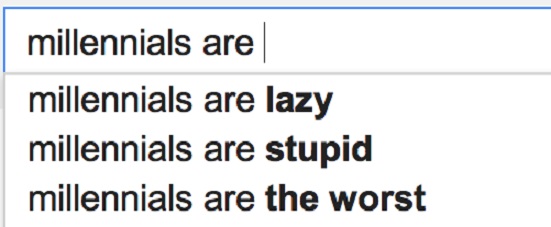Don’t Call Millennials Lazy

“All millennials are lazy.” Ever heard that before? Prior generations continue to categorize the millennial generation as lazy. This stereotype has been enforced so much that a google search is all it takes to prove it. However, do they really understand their claims?
November 2, 2017
Teachers, parents and pretty much any generation born prior to the 1990’s tend to come to the general assumption that millennials and the children of this generation are lacking in work ethic, are unreliable, and above all, down right lazy. However, many, not only the millennials, will disagree with this claim.
First of all, the millennial generation consists of all those born between approximately 1990 until about 2006. This generation was born and raised in a time where handheld technologies such as the smartphone and tablet, designed to make everyday life easier, have became accessible to the average middle class family. The general stereotype of millennial laziness begins with these devices. Because millennials have not grown up with always having endless information at their fingertips, they greatly depend on such items for everyday life. Therefore, when asked to do things the traditional way, such as looking up a word in the dictionary, millennials respond, “I can just look that up on my phone.” This results in adults arriving at the conclusion that they are lazy, when in reality, the millennial generation has simply become accustomed to doing tasks in a faster and more efficient way.
The circumstantial yet vast differences between the millennials and their prior generations are the main reasons as to why the millennials are not lazy. The millennials, who are still in school and are categorized as lazy by the adults in their life, can validly make the argument that getting an education is most definitely not the same as it was twenty-years ago. Classes are harder, students are held to a higher standard and it is overall more rigorous. The competition amongst peers is greater and far more intense. High school junior, Kaitlyn McGrady, says, “Our parents definitely don’t understand that classes are way harder and clubs and extracurriculars involve so much more competition than they used to. It is frustrating when they don’t understand why we struggle.”
For those millennials that are not in school, but have moved on into the job market, epitomize the exact opposite of laziness. Most argue that they are “workaholics”, employees that are hard working and relentless in their work. According to U.S Census figures, in generations prior to the millennials, 59 percent of Americans within the age 18-29 were already married. However, in 2011, that percentage for the same age range dropped to 20 percent. This is because instead of getting married, millennials are focusing on their work, education and careers, not relationships; therefore proving that millennials do not have a do-nothing attitude regarding work.
The current generation of innovators are representative of a society that is far from lazy. Adults and older generations assume that millennials are lazy simply based on the limited sample of millennials they have had experience with; however, if millennials continue to change all fronts of industries, this stereotype will soon be changed.



